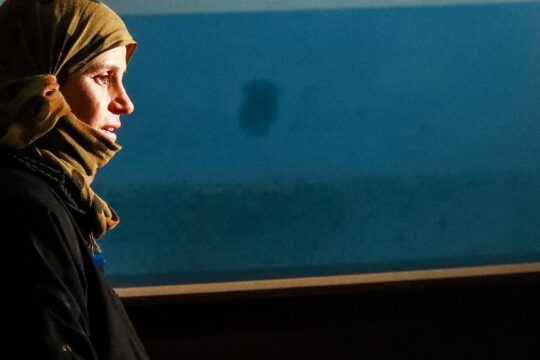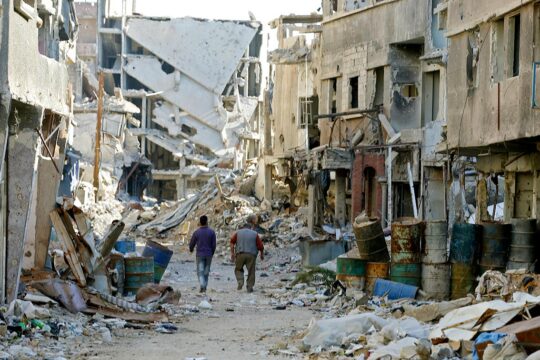Trapped Syrian civilians and rebels waited desperately Saturday for evacuations to resume from an opposition-held enclave in Aleppo as the Red Cross pleaded for a deal to "save thousands of lives".
A rebel representative told AFP an agreement had been reached to allow more people to leave the city, which has been ravaged by some of the worst violence of the nearly six-year war that has killed more than 310,000 people.
But there was no confirmation from President Bashar al-Assad's regime or its staunch allies Russia and Iran, which are under mounting international pressure to end what US President Barack Obama denounced as the "horror" in Aleppo.
Families spent the night in freezing temperatures in bombed out apartment blocks in Al-Amiriyah district, the departure point for evacuations before they were halted on Friday, an AFP correspondent reported.
Abu Omar said that after waiting outside in the cold for nine hours the previous day, he had returned on Saturday only to be told by rebels the buses were not coming.
"I'm tired of having to carry all our things and come back every day for nothing," he said.
"There's no more food or drinking water, and the situation is getting worse by the day," he said, adding that his four children were sick because of the cold.
The International Committee of the Red Cross (ICRC) appealed for safe passage for the thousands of people including women, children, sick and injured who waited through the night "in constant fear and anxiety".
"People have suffered a lot. Please come to an agreement and help save thousands of lives," said ICRC Syria delegation head Marianne Gasser.
"We cannot abandon these people."
- Trading accusations -
The government blamed rebels for the suspension of the evacuation operation which had begun on Thursday, saying they had tried to smuggle out heavy weapons and hostages.
The opposition accused the government of halting the operation in a bid to secure the evacuation of residents from Fuaa and Kafraya, two villages under rebel siege in northwestern Syria.
In return, the rebels want the evacuation of the towns of Madaya and Zabadani in Damascus province which are besieged by the regime.
Al-Farook Abu Bakr, a representative of the hardline Islamist rebel group Ahrar al-Sham, said Saturday a deal had been reached for the evacuations to resume.
"There will be evacuations from Fuaa and Kafraya, as well as Madaya and Zabadani, and all the residents of Aleppo and the fighters will leave," he said.
But there was no announcement of an agreement from the government.
UN envoy Staffan de Mistura estimated that as of Thursday there were around 40,000 civilians and perhaps as many as 5,000 opposition fighters in Aleppo's rebel enclave.
Before evacuations were suspended around 8,500 people, including some 3,000 fighters, left for rebel-held territory elsewhere in the north, according to the Syrian Observatory for Human Rights, a Britain-based monitoring group.
"The evacuations are expected to resume on Saturday in Aleppo, in synchronisation with the evacuation from Fuaa and Kafraya of around 4,000 people -- the wounded and their families, as well as civilians and orphans," Observatory director Rami Abdel Rahman said.
- Women, children trapped -
Tens of thousands of civilians had already fled opposition-controlled parts of Aleppo after the regime began its latest assault in mid-November.
The Russian defence ministry said after evacuations were suspended that only hardline rebels remained.
"The operation has also opened a new window for the possibility of establishing a halt to hostilities not only in Aleppo province but in other areas of Syria," the ministry said.
On Friday, a convoy of evacuees that had already left east Aleppo when the operation was suspended was forced to turn back, an AFP correspondent said.
The ICRC, supervising the evacuations, said it was looking into reports of shooting before the convoy was turned around.
The main regional supporters of the rival sides in Syria's devastating civil war engaged in a flurry of diplomacy to try to secure a resumption of evacuations.
Turkish Foreign Minister Mevlut Cavusoglu, whose government is a key backer of the opposition, said he had spoken more than a dozen times with his Iranian counterpart, Mohammad Javad Zarif, on Friday.
Cavusoglu and Lavrov also took part in a three-way call with Russian Foreign Minister Sergei Lavrov on Saturday, Moscow said.
In New York, the UN Security Council could vote as early as this weekend on a French-drafted proposal to allow international observers in Aleppo and ensure urgent aid deliveries.
Obama called Friday for impartial observers to monitor efforts to evacuate civilians from the devastated city, and warned Assad he would not be able to "slaughter his way to legitimacy".


